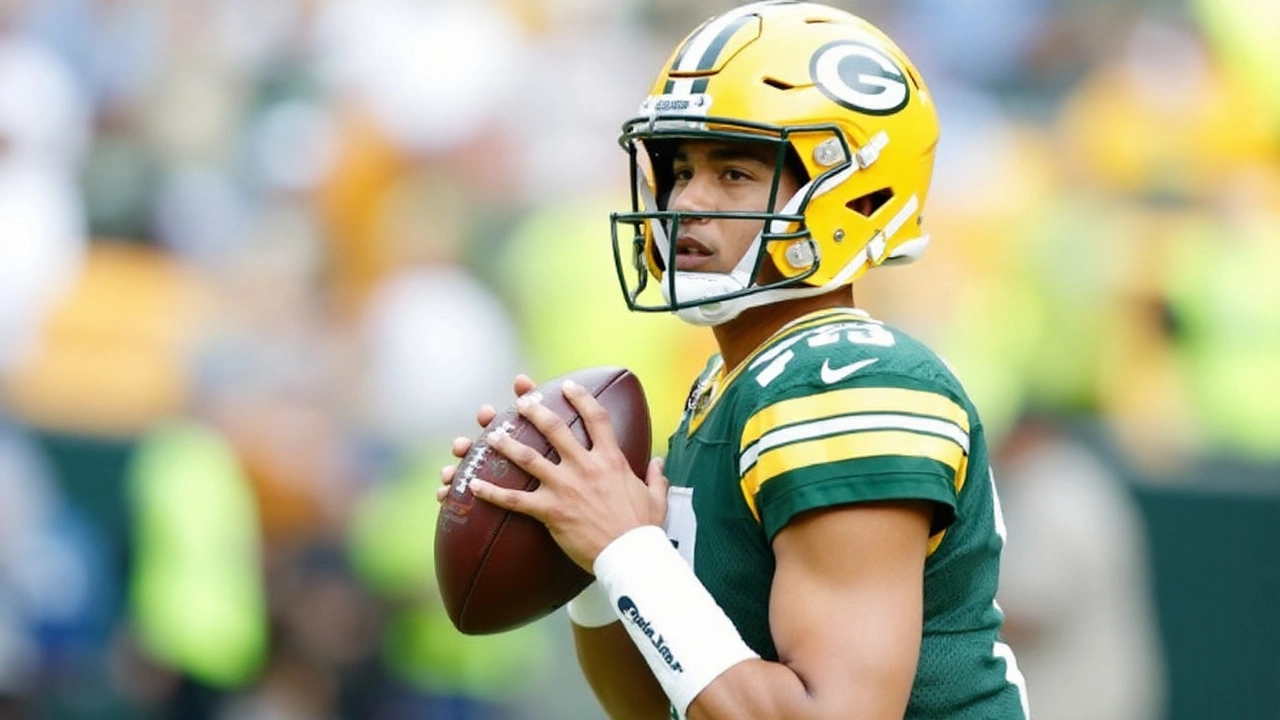The Green Bay Packers didn’t just win; they dictated every beat of Thursday Night Football at Lambeau Field. A fast 14-0 start, a defense that refused to budge, and a statement from a young passing game added up to a 27-18 victory over the Washington Commanders and a 2-0 start that feels more real than early-season hype. Washington dropped to 1-1, and the final score was kinder than the flow of the game.
Jordan Love looked comfortable from the jump. He spread the ball around, ripped throws into the middle of the field, and handled pressure without panic. Even after losing receiver Jayden Reed to a first-quarter shoulder injury, Love piloted a balanced, on-schedule offense that stacked points, ate clock, and left Washington chasing. Green Bay never trailed, and the tone never really changed.
There was a blueprint to it. Tucker Kraft gave the Packers a true matchup problem and turned routine completions into chunk plays with yards after the catch. Josh Jacobs powered the ground game and kept the playbook open. Meanwhile, the defense slammed the door on Washington’s run game and turned the pocket into a crowded room for Jayden Daniels. By the time the Commanders found rhythm late, it was too late.
Love and Kraft headline a balanced, efficient offense
Love finished with 292 passing yards and two touchdowns, and the box score matches the eye test: he played in command. Green Bay pushed the ball in the 10–20 yard window—deep enough to challenge, quick enough to avoid hits—and Love kept the ball out of harm’s way. He didn’t force throws outside the numbers or into bracket looks; he took the leverage wins and lived to the next down when the picture wasn’t clean.
Kraft stole the show. Six catches, 124 yards, and a score doesn’t fully capture how he changed the geometry of the field. Green Bay used him on crossers, seams, and play-action delays, and Washington’s linebackers never found a good answer. The tight end kept slipping through first contact, turning five-yard gains into 15. It was his first 100-yard receiving game in the NFL, and it felt like a preview rather than a one-off.
Reed’s early exit could have stalled the plan. Instead, the Packers pivoted. They leaned into tight end-heavy looks and moved their remaining wideouts through motion and stacks to give Love clean releases. You could see the confidence build in the second quarter: quick rhythm throws, then a shot off a look Washington had just seen. That’s how you keep a defense guessing without taking unnecessary risks.
Jacobs gave the offense the balance it needed. His 23 carries for 84 yards and a touchdown won’t light up fantasy apps, but the runs mattered: early-down efficiency, red-zone trust, and enough grind to keep Washington’s front honest. He hit inside zones, bounced a few duo looks when the edge was soft, and dented the front on short yardage. When the Packers needed four, he found five.
Green Bay’s line also did its part. Pass protection held up on longer-developing concepts, and the interior anchored well against stunts. Love had time to confirm his reads, especially on middle-field throws to Kraft. On third downs, spacing was clean—high–low reads, a crosser as a lever, and a checkdown if nothing popped. It looked rehearsed because it was; Green Bay stayed out of desperation snaps.
How did the points stack up? A patient opening march ended with Jacobs finishing at the goal line. Not long after, Kraft got free up the seam for a touchdown that made it 14-0 and put Washington in scramble mode. From there, two field goals cushioned the lead, and a fourth-quarter touchdown pushed it to 27-10 with 6:42 left—essentially the knockout punch. The Packers didn’t need fireworks; they needed control, and they had it.
Context-wise, this is the kind of step you want in Week 2. Love was decisive, Kraft became a featured piece, and the play-action game looked connected to the run. The only caveat: Reed’s shoulder. The Packers will hope the early exit is more precaution than problem, because his speed changes coverages. Still, seeing the offense adapt without its vertical stretcher is a real positive.

Defense smothers Washington as Parsons reshapes the front
Washington managed 230 total yards, 15 first downs, and went 5-for-16 on third down. That’s not just a good defensive night; that’s control. Green Bay took away the run first, holding the Commanders to 51 yards on 19 attempts. With the ground game bottled, Washington’s play-action teeth disappeared, and drives turned into third-and-long problems.
The headliner on that side is the arrival of Micah Parsons. His presence changes the math. Even when he didn’t make the play, he warped protections—chips, slides, and backs staying in. That freed teammates to win one-on-ones and squeezed the edges so Daniels couldn’t threaten outside the pocket as often. The rush lanes were disciplined, which matters against a mobile quarterback who loves to stress contain and extend downs.
Green Bay mixed coverages behind the rush. They showed single-high pre-snap, spun to two-high shells, and baited a few throws into flat defenders who were lurking. Terry McLaurin had moments because he’s too good not to, and Deebo Samuel broke free late for a touchdown that cut it to 27-18 after a two-point conversion. But until the fourth quarter, Washington found almost nothing clean vertically.
The most telling stretch? Washington opened with seven drives that produced just three points. The Packers tackled cleanly, stayed ahead of the sticks defensively, and played the field-position game. When Green Bay extended to 27-10 in the fourth, the Commanders needed perfection and pace. They got one late drive and the two-point try, but by then the Packers were milking clock and forcing underneath throws.
Daniels deserves credit for hanging in. He stood in against pressure, used his legs to survive a few broken pockets, and kept looking downfield. He found McLaurin on timing routes and connected with Samuel on the late score. The problem was everything around him: a run game that never found traction, and third downs that demanded heroics. That’s a tough way to live on the road against a defense flying around.
For Green Bay, this is the template: front-four rush that affects the game, linebackers who trigger downhill against the run, and a secondary that disguises just enough to make quarterbacks second-guess. Add in Parsons’ ability to win fast and draw extra attention, and you get a unit that plays downhill and sets up short fields. Two weeks in, the identity is obvious.
By the numbers, the performance reads as complete:
- Offense: 404 total yards, with Love throwing for 292 and two touchdowns.
- Tucker Kraft: 6 catches, 124 yards, 1 touchdown—his first 100-yard game.
- Josh Jacobs: 23 carries, 84 yards, 1 touchdown, steady in short yardage.
- Defense: 230 yards allowed, Washington 5-of-16 on third down, 51 rushing yards surrendered.
Zoom out a little, and the win says something bigger about where Green Bay is headed. Love looks comfortable running the show and smart about risk. Kraft gives the offense a second pillar next to the run game. Parsons’ arrival on defense has lifted the ceiling while making everyone else’s job a little easier. Special teams held serve. And the coaching staff stitched it all together with a plan that fit the roster and the opponent.
There’s still work to do. The red zone can be sharper—two field goals in control games are fine, but those are chances to bury opponents. Health is a watch item with Reed’s shoulder. And defenses will adjust to Kraft’s expanded role, rolling safeties his way and daring other targets to win. That’s the dance of a long season.
For Washington, this one is a measuring stick. They got a gut check on the road against a team that hit hard at the line of scrimmage. The positives are real—Daniels’ poise, McLaurin’s reliability, Samuel’s playmaking late. But the line has to steady the pocket, and the run game needs answers early in downs to keep the offense on schedule. Otherwise, they’ll keep facing the kind of third downs that favor the rush and compress the field.
The scoreboard said 27-18, but the feel was cleaner than that for Green Bay. They owned the early script, leaned on their stars, and smothered the parts of Washington’s offense that travel. Two games, two wins, and a version of complementary football that tends to hold up when the weather turns and the field tilts. If this is the baseline, Green Bay’s ceiling sits a lot higher than last year’s ending suggested.






